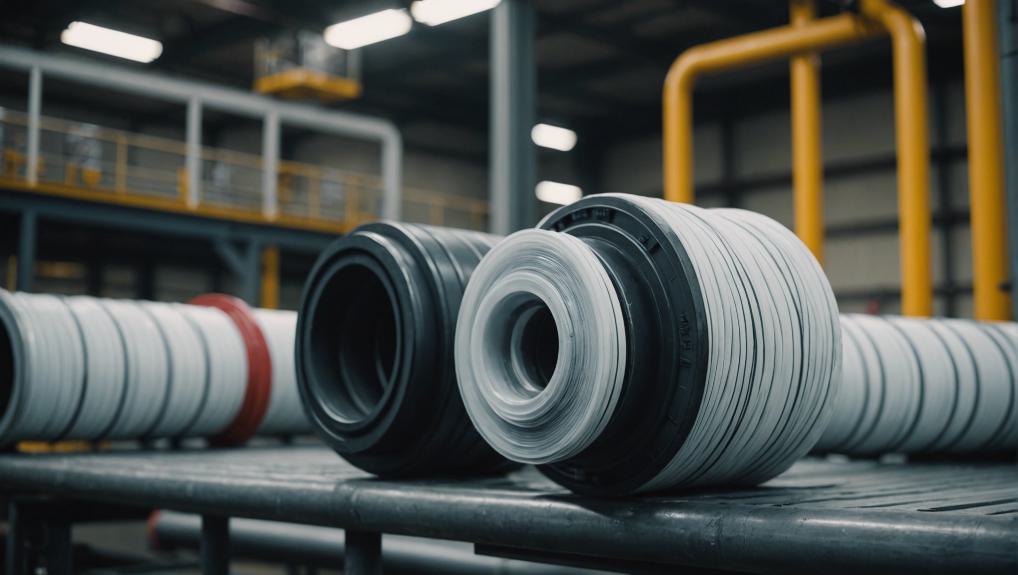
When you're selecting materials for expansion joints, you need fabrics that can withstand harsh chemicals and extreme environments. Among the top contenders are PTFE-coated fiberglass, Teflon impregnated fabrics, and silicone coated fiberglass. Each material offers unique benefits: PTFE-coated fiberglass excels in temperature and chemical resistance, Teflon fabrics are essential for maintaining tight seals due to their low friction properties, and silicone coated options provide superior durability against weathering and ozone damage. Choosing the right fabric impacts the longevity and efficiency of your expansion joints greatly, and understanding these differences could greatly influence your final decision. What factors might sway your choice towards one of these options?
PTFE-Coated Fiberglass Overview
PTFE-coated fiberglass offers exceptional resistance to chemicals, making it an ideal choice for expansion joints in harsh environments. You'll find this material stands up to extreme acids, bases, and solvents that would typically degrade other fabrics. What sets it apart is its ability to maintain integrity over a wide temperature range, from -100°F to +500°F, ensuring its performance isn't compromised whether you're dealing with cryogenic conditions or extreme heat.
Beyond chemical and thermal resistance, this fabric boasts a low coefficient of friction. This means it's not only durable but also minimizes wear and energy consumption in applications where sliding movements are frequent. It's an efficient choice for industries where operational longevity and reliability are critical.
Moreover, its non-stick surface simplifies maintenance. You won't have to struggle with sticky residues or perform frequent cleaning, which is often necessary with other materials. This feature alone can save you significant time and effort, reducing downtime and enhancing productivity.
Given these properties, it's clear why PTFE-coated fiberglass is favored in sectors like petrochemical, automotive, and aerospace for creating expansion joints that need to perform flawlessly under challenging conditions. You're investing in durability and efficiency when you choose this advanced material.
Exploring Teflon Impregnated Fabrics
Teflon impregnated fabrics offer you enhanced durability and chemical resistance, making them another excellent choice for expansion joints in demanding environments. These materials are specially designed to withstand various industrial challenges, providing a robust solution where standard materials might fail.
Here's why you should consider Teflon impregnated fabrics for your application:
- Vital Chemical Resistance: They can resist a wide range of chemicals, ensuring longevity in environments exposed to corrosive substances.
- High Temperature Tolerance: These fabrics perform exceptionally well under high temperatures, maintaining their integrity and effectiveness.
- Essential Friction Coefficient: The smooth surface reduces wear and tear on adjoining surfaces, minimizing maintenance needs.
- UV Stability: Teflon impregnated fabrics are resistant to UV degradation, making them suitable for outdoor applications.
- Flexibility: Despite their strength, these fabrics remain flexible, which is vital for ensuring tight seals in expansion joints.
Choosing Teflon impregnated fabrics means you're opting for a solution that's built to last, even in the harshest conditions. Don't overlook their potential in helping you achieve operational efficiency and safety. Remember, the right materials can dramatically reduce downtime and maintenance costs.
Benefits of Silicone Coated Fiberglass
Silicone coated fiberglass offers exceptional versatility and protection, making it a superior choice for your expansion joint needs. This material combines the strength and durability of fiberglass with the enhanced properties of silicone, providing a robust solution that withstands a wide range of temperatures and environmental conditions. It's particularly suited for areas where both thermal stability and flexibility are essential.
You'll appreciate its resistance to ozone, sunlight, and weathering, ensuring a long service life with minimal degradation. The silicone enhancement also makes the fabric resistant to moisture, oil, and many chemicals, greatly reducing the risks of corrosion and leaks that can occur with other materials. This can save you costly repairs and downtime over the lifespan of the product.
Moreover, the flexibility of silicone coated fiberglass allows for easier handling and installation. It can be custom-fitted to meet specific dimensions and shapes, which is ideal for complex or unusual expansion joint configurations. The ease of maintenance is another benefit; it cleans easily and doesn't require frequent replacement or intensive care.
Conclusion
You've seen how PTFE-coated fiberglass, Teflon impregnated fabrics, and silicone coated fiberglass stand out as top choices for expansion joints. Each offers unique benefits:
PTFE-coated fiberglass excels in chemical resistance and temperature range.
Teflon fabrics shine with their seal integrity and high temperature tolerance.
Silicone coated fiberglass adapts well to various environmental conditions, ensuring durability.
Depending on your industry's specific needs, selecting the right fabric can greatly enhance the longevity and performance of your expansion joints.
© Copyright 2024. All RIghts Reserved
